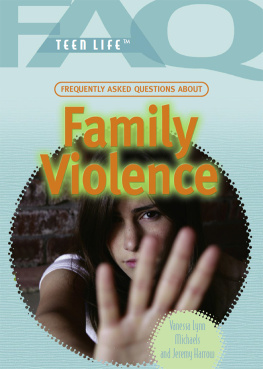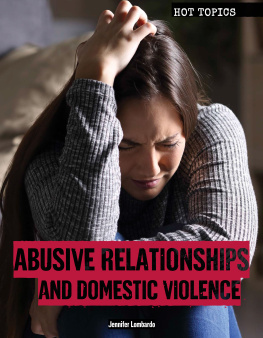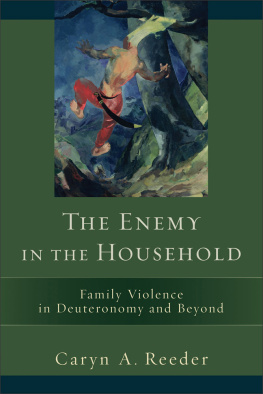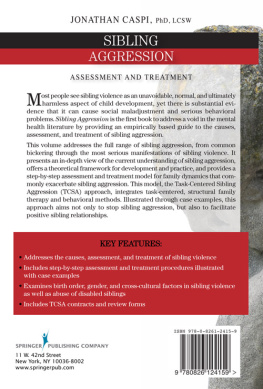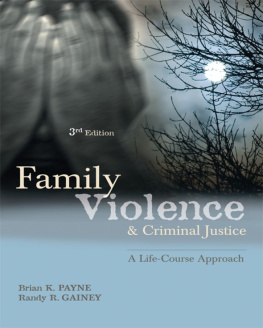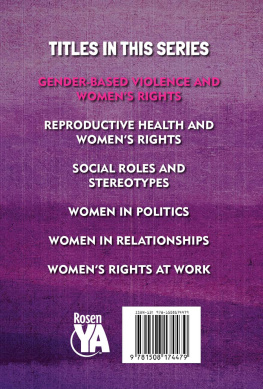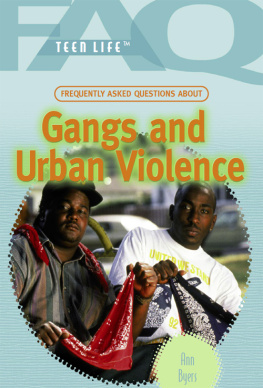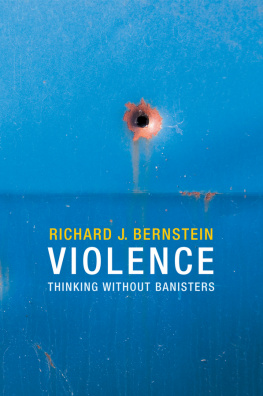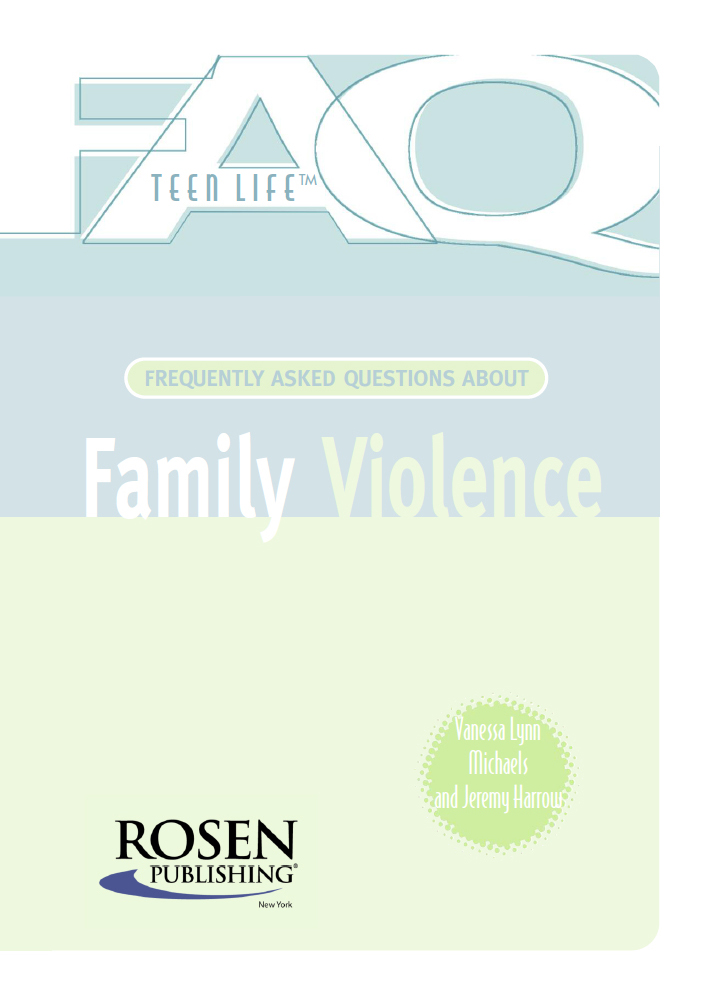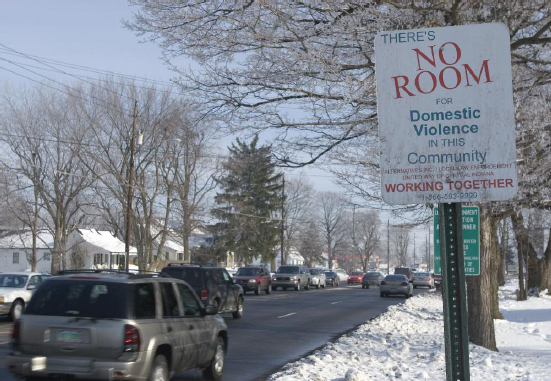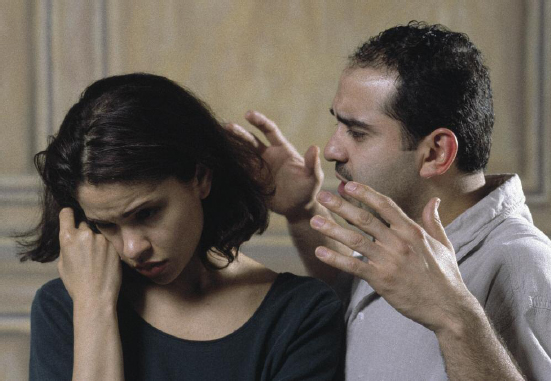Published in 2012 by The Rosen Publishing Group, Inc.
29 East 21st Street, New York, NY 10010
Copyright 2012 by The Rosen Publishing Group, Inc.
First Edition
All rights reserved. No part of this book may be reproduced in any form without permission in writing from the publisher, except by a reviewer.
Library of Congress Cataloging-in-Publication Data
Michaels, Vanessa Lynn.
Frequently asked questions about family violence / Vanessa Lynn
Michaels, Jeremy Harrow.
p. cm.(FAQ: teen life)
Includes bibliographical references and index.
ISBN 978-1-4488-4628-3 (library binding)
1. Family violenceJuvenile literature. 2. Family violence United StatesJuvenile literature. I. Harrow, Jeremy. II. Title. HV6626.M526 2012
362.82'92dc22
2010051936
Manufactured in the United States of America
CPSIA Compliance Information: Batch #S11YA: For further information, contact Rosen Publishing, New York, New York, at 1-800-237-9932.
Contents
What Is Family Violence?
What Are the Types of Abuse?
What Are the Warning Signs?
Why Does Family Violence Happen?
How Do I Break the Cycle of Abuse?
What Are My Rights?
How Do I Survive the Abuse?
Glossary
For More Information
For Further Reading
Index
Chapter one
WHAT IS FAMILY VIOLENCE?
Family violence is often the worst kind of violence. It is the ultimate cruelty because it is committed by someone close to you, someone whom you love, respect, or trust. Family violence can occur between spouses, a parent and a child, or any family member with whom you live. These are the people with whom you expect to feel safe but end up becoming the people you fear the most. Whether the abuse is from your parents, another family member, or a legal guardian, its family violence, and they have no right to do it to you. Its always wrong, and its illegal. In cases of assault, harassment, incest, or rape, its a serious crime. You do not have to keep it a secret, and you do not have to keep living with it, even if youre just a witness to it. You have a right to feel safe in your house or in any kind of relationship with the people who are closest to you.
The Reality
In 2003, the U.S. Department of Justice reported that an act of domestic violence occurs at least once a year in 50 percent of all American homes. According to its statistics, family violence represented 11 percent of all violence between 1998 and 2002. If that figure isnt frightening enough, that 11 percent counted for roughly 3.5 million crimes. Half of those cases were committed against a spouse, and the other half consisted of abuse against other family members, such as sons or daughters. More recently, the failing economy has been linked with an increase in domestic violence: a six-week study conducted by the National Domestic Violence Hotline indicated that 54 percent of callers reported a change in their households financial situation in the past year. If you are in a domestic violence situation, you are not alone.
The Cost of Family Violence
The mental and physical cost to victims is not the only cost of family violence. There is also a significant financial cost for abuse victims.
According to the Texas Council on Family Violence, women who are abused spend 42 percent more on health care each year than women who are not abused. And the increased cost continues even after the abuse ends. Women who had experienced abuse five or more years before continued to pay 19 percent per year more on health care.
Family violence can occur between parents, siblings, or a parent and child. If someone you know is the victim of family violence, go to a teacher, parent, or school counselor for help.
It Can Happen to Anyone
Domestic violence can happen to anybody. Men, women, and children of all backgrounds can be abused or witness abuse. However, most studies show that women are more often victimized within families than men.
Abuse in relationships often happens to people who have less power and fewer ways to protect themselves, mainly women, and children. However, it is important to realize that women and children are not always the only people being mistreated. Women can abuse men, and children can attack their parents. These cases are rare, but they can and do happen.
People in domestic violence situations are more likely to be abused again than are victims of other types of crime. This behavior is called the cycle of violence. Also, many people who commit these crimes were once abused themselves, usually when they were young. The experience of living with violence is terrifying and harmful. Abused people feel alone and are often ashamed of the abuse. They feel that they are to blame or that they deserve it. They may stay silent because they are afraid of being hurt by their abusers.
Reaching Out for Help
If your parent is abused by your other parent or somebody else, it is important for you to talk to him or her. Ask your parent about the situation and express your feelings. If your parent is unable to make you feel safe, you should go to a school counselor or other trusted adult to get help. If you are the one being abused, find a good friend or a trusted adult. This is a brave and necessary step.
Many communities have programs dedicated to fighting and preventing family violence, like this one in Cumberland, Indiana, a suburb of Indianapolis.
There are people and many organizations that want to help you, but you need to reach out for the help. You need to make the decision to get out of the dangerous situation. Your call will begin the healing process. It is the only way to break the cycle of family violence.
Chapter two
WHAT ARE THE TYPES OF ABUSE?
Abuse can be physical, emotional, or sexual. The law defines family violence as an act of violence committed by: a spouse or former spouse; someone with whom you have a child in common; an adult person related to you by blood or marriage; an adult person who lives with you or used to live with you; or someone with whom you have a legal parent/child relationship.
Emotional Abuse
Emotional abuse is more difficult to see, but the effects are just as painful. Many people may not even realize they are being emotionally abused. Emotional abuse includes name-calling, insults, blaming, threats, or gestures that cause someone to feel sad, worthless, and degraded.
Abuse can be physical or emotional. Just because an abuser isnt using his or her fists doesnt mean it isnt causing harm to a family member. Verbal abuse can be as harmful as physical abuse.
When parents make their children feel worthless, they are being abusive. Emotional abuse can ruin a persons self-esteem because he or she may grow to believe that the parents insults are true. A person may not realize that the parent is simply being unreasonable and hurtful. Often the parent may be expressing anger that was caused by something completely unrelated to anything the son or daughter did.
Emotional abuse tears down your self-esteem. The abuser makes you feel worthless. He or she controls you and puts you down through words and threats instead of physical actions. Emotional abuse is damaging and hurtful. It is just as important to seek counseling and safety for somebody who faces emotional abuse as it is for somebody experiencing physical or sexual abuse.

